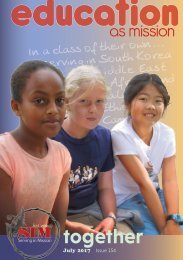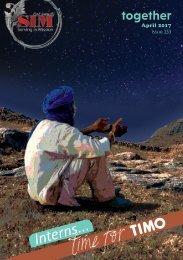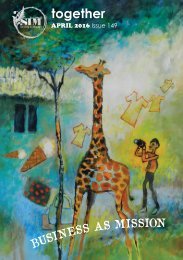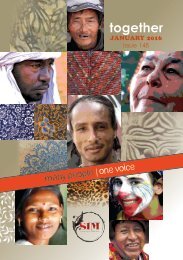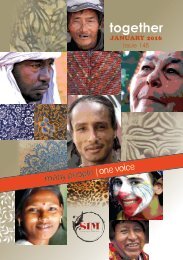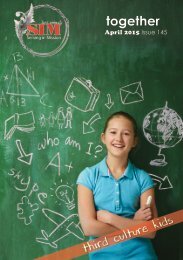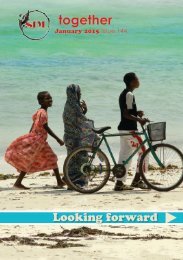together
Create successful ePaper yourself
Turn your PDF publications into a flip-book with our unique Google optimized e-Paper software.
<strong>together</strong><br />
July 2015 Issue 146
Cross-cultural mission<br />
... it’s in our DNA!<br />
SIM: 4000 workers (including over 2330<br />
mission partners) from 70 different<br />
nationalities serving around the world.<br />
The driving<br />
force behind<br />
everything we<br />
do is to share<br />
the Gospel<br />
where Christ is<br />
least known.<br />
For over 120 years,<br />
SIM has remained<br />
committed to this vision. It’s<br />
part of our DNA to partner<br />
with Christians who are willing to<br />
go to the toughest places on earth to<br />
show and tell the love of Jesus.<br />
Official publication<br />
of SIM New Zealand<br />
(Serving In Mission), an<br />
inter-denominational<br />
evangelical Protestant<br />
mission.<br />
For security reasons<br />
some contributors may<br />
use pseudonyms. Stock<br />
photos are sometimes<br />
used to help represent<br />
stories. Except for stock<br />
photographs, all images<br />
copyright ©2013 SIM<br />
and its licensors. All<br />
rights reserved. SIM<br />
New Zealand (#CC28002)<br />
is a registered charitable<br />
entity in terms of the<br />
Charities Act 2005.<br />
For more information,<br />
visit the Charities<br />
Register at www.<br />
charities.govt.nz<br />
SIM New Zealand, PO<br />
Box 38-588, Howick,<br />
Auckland, 2145<br />
Phone: 09 538 0004;<br />
Freephone: 0508 47 46<br />
69; Email: nz.info@sim.<br />
org<br />
Office: 12B Picton Street,<br />
Howick, Auckland, 2014<br />
in this issue<br />
We look at the idea of ‘Not Too Late’, hearing from some of our people<br />
who have served as older mission partners, who have taken off after<br />
the nest has emptied, or after mid-life retraining for a new direction,<br />
or even instead of retirement. There’s also a report on the reader survey<br />
in our April issue and more stories from people serving overseas.<br />
The daily prayer notes found as a pull-out section in the print version<br />
of this magazine, are not being posted in this trial web version —<br />
otherwise this has essentially the same content.<br />
2
Naomi Simpson<br />
“I’m going to Mukinge Hill Academy in Zambia,<br />
where I will be a teacher assistant for 6 months.<br />
I‘m originally from Northern Ireland and now<br />
live in Ashhurst near Palmerston North working<br />
as administrator in a plant nursery. My home<br />
church is Emmanuel Congregational Church.<br />
I’ve had heart for missions since I was 13 and I’m<br />
being led to serve Him full time.”<br />
nomi.simpson1@gmail.com<br />
Anna Brown<br />
Anna’s mission service is to Hope Medical<br />
Centre, Lilongwe, Malawi where she will be<br />
involved in medical ministry as a nurse<br />
from August 2015 for a period of 4<br />
months.<br />
Her supporting church is Kumeu Baptist<br />
Church, Auckland<br />
brown.a@hotmail.com<br />
Why are the<br />
Shemwells going to<br />
Nepal?<br />
To see the new 3-minute<br />
promotional video about<br />
them, go to<br />
https://www.vimeo.com/130867622<br />
3
taking the plunge<br />
NOT to TOO go and LATE serve<br />
overseas at 50+!<br />
“One of the great things about getting to 60 was discovering a<br />
whole new chapter in life,” says a Kiwi mission partner who headed<br />
overseas aged 61. “In fact as an older person I’m much freer to go<br />
now. I have more skills, wisdom and experience to share and probably<br />
have more of a heart to serve.<br />
“Any concern that I might not remain healthy and strong enough<br />
simply dissipated as I’ve learned to take it one year at a time... that<br />
is God’s department. If the next year turns out to be the last, well, it<br />
will have been ten years well spent.”<br />
There’s a big range of options, from retired doctors sharing their speciality,<br />
to former admin people helping out with office work, to going to teach<br />
English as a second language; from being an encourager and discipler to<br />
being a ‘real Kiwi bloke’. It’s pretty much a case of whatever your skills are,<br />
that’s what you can do. Not all mission locations need you to become fluent<br />
in another language (definitely this gets harder as you age!)<br />
Yes, some fit, mature people have family commitments with grand kids<br />
or elderly relatives; others might have a spouse who can’t travel. But if not,<br />
how sad to sit at home saying, “It’s too late”, just because you didn’t dare<br />
to think it possible — if God is calling you to a new venture in your life.<br />
Here are some comments that might be helpful, from some who have taken<br />
the plunge and gone.<br />
4
“...this was different,<br />
and definitely a<br />
call from God”<br />
Keith & Sandra Aitken<br />
Keith was 61 and Sandra 55, when the Aitkens went short term to Danja<br />
Hospital in Niger in 2009-10. As a diabetes podiatrist specialist Keith had<br />
had many offers to go overseas, but he says this was different and definitely a<br />
call from God.<br />
At a conference in 2008 he heard a speaker from Africa saying how<br />
desperately they needed someone to do this work, and Keith felt the Holy<br />
Spirit stir within him; later in a supermarket they met up with a former GP<br />
who said he’d come back from working<br />
at a Leprosarium in Niger. The very<br />
next day SIM Director Nigel Webb was<br />
speaking at the Aitken’s church — that’s<br />
right, he had just been in Niger, at the<br />
same Leprosarium. They realised that<br />
the Lord’s leading couldn’t be more<br />
clear.<br />
Once in Niger, Sandra, a secondary<br />
school bursar at home, helped in<br />
the hospital pharmacy while Keith<br />
worked on the lepers’ ulcerated feet in<br />
the operating theatre. Despite border<br />
closures and political unrest while<br />
they were there, they were kept safe<br />
physically, emotionally and spiritually.<br />
Keith says, “We attended a Christian<br />
church in a Muslim country, experiencing<br />
beautiful, true worship with<br />
authentic Christians whose very lives<br />
depended on their faith.” Though there was desperation in the country, these<br />
Christians experienced none of it. Since returning home, the impact of the<br />
trip has led to the Aitkens having major roles in their home community.<br />
Retired farmers Noel and Elaine Reid were in their early 60s, choosing<br />
Malawi because of the fact that English is widely spoken. On their first<br />
short term trip they helped re-roof a mission house. For the past eight years<br />
they’ve gone back, alternating between Malawi and Zambia. They say, “It<br />
feels rather like going back to family as we return each time.”<br />
Gabriel and Biz Jens see their current posting in Nepal, where they<br />
arrived late last year, as “part of their life cycle”. The first part of life was<br />
geared towards getting themselves and their children set up, getting<br />
5 continues over the page u
qualifications and experience. “Then<br />
from our 50s onwards we don’t have to<br />
prove ourselves any more, and we can<br />
think about serving others in areas of<br />
the world where God is not known.”<br />
Gabriel, 57, and Biz, 56, see the next<br />
10 years being given to God overseas.<br />
The Jens spent 12 years in Africa<br />
with SIM as a younger couple, before<br />
returning to Hamilton in 2000. They<br />
see when they look back how God<br />
prepared them in advance for Nepal.<br />
Gabriel had roles in logistics, urban<br />
ministry and relief work (Ethiopia)<br />
before training for the ministry (NZ)<br />
and becoming a vicar. Biz taught ESL,<br />
and finished her Masters in Applied<br />
Linguistics last year.<br />
Kaylene Yeoman<br />
“It just took me longer with<br />
God, than it took Dean, to be<br />
confident to let go of the<br />
comfortable and familiar...”<br />
“In our 50s we have<br />
time to start thinking<br />
how to finish well in<br />
the years that have<br />
been allotted to us”<br />
Gabriel and Biz Jens<br />
He is now director of the SIM<br />
team in Nepal, being thrown into the<br />
very special challenges of earthquake<br />
damage / opportunity. She is head of ESL at the Kathmandu International<br />
Study Centre which gives the couple a work permit. They say, “When you<br />
are older you know yourselves and are more comfortable in your own skin.”<br />
Kaylene Yeoman, with husband Dean in Mercy Air flying into Mozambique,<br />
adds that as mature people “we have ‘done a lot more life’; we are<br />
more accepting of different viewpoints. And in Africa where age is revered,<br />
we have gained some status with our additional years!” Dean, a helicopter<br />
pilot, is 59 and Kaylene, an ESL teacher, 60.<br />
6
“Short term work has<br />
given me a sense of<br />
fulfilment, being of<br />
use to those who had<br />
been called to full<br />
time service.”<br />
7<br />
Helen Scarlet<br />
The Yeomans have also returned to<br />
mission work as a mature couple after<br />
first going out as a young family, then<br />
coming home for kids’ schooling. “We<br />
had unfinished business from our first<br />
missionary adventure,” Kaylene says,<br />
but by then she was 58 and in a secure,<br />
well-paid job in a school management<br />
team and it was difficult to leave. A<br />
quote by an older couple inspired her:<br />
“We can either sit sensibly at home<br />
and die of safe futility, or we can take a<br />
fresh look at what we’ve sung, spoken<br />
of and believed for a lifetime. Is God<br />
really faithful? Can I trust him with<br />
my future?”<br />
Helen Scarlet and husband Stan<br />
first went as mission partners in their<br />
late 50s, spending six months in Niger<br />
at Sahel Academy; she served in the<br />
school office and he did maintenance.<br />
After being widowed in 2004 she still had a desire to serve, and has gone to<br />
Africa regularly ever since, most recently to Botswana last year at 71. She<br />
points out that a good thing about short term postings is that she was able<br />
to get in on a visitor visa.<br />
Lois and Dave Freeman went to Niger in their early 50s; they had<br />
both felt a calling as single people but had not been ‘sent yet’. Then with<br />
children having left home, the time was right. Dave’s ability to fix anything<br />
‘with baling twine and No 8 wire’, knowing mechanics, building, farming,<br />
boat-building and horticulture, and Lois’s skills in hospitality, farming<br />
and counselling made them invaluable first at Galmi Hospital then Sahel<br />
Academy. They came home because Lois’s mum needed care, but would go<br />
again in future.<br />
Keith Aitken sums up the experience: “... a huge impact on our lives and<br />
our spirituality ... a stretching experience that helped us become authentic<br />
Christians who recognise God’s fingerprints in our everyday lives. We were<br />
only doing supermarket shopping, and we ended up in Niger... What could<br />
God do for you — and more importantly what could you do for him?” ❧
Mission partners aren’t exempt<br />
from having to cope with<br />
others’ difficult personalities.<br />
Meryl Ashworth shares<br />
her experience<br />
to<br />
Korea<br />
with<br />
love<br />
“What’s it like” I’ve been asked, “being in Korea after working<br />
in the bush in Ethiopia?” Actually a lot of it is similar. Being a<br />
missionary means having contact – lots of contact – with people<br />
of another nationality, and for me that is no different, whether<br />
in the remote areas of Ethiopia or in a city of many millions in<br />
South Korea.<br />
My best and worst experiences here have been connected with people,<br />
namely, my students. Training Koreans for the mission field does include<br />
teaching, but it’s also a lot of discipling and mentoring, being part of the students’<br />
lives and being vulnerable, allowing them to see right into my life, to<br />
see how I live and think and react in many different situations. I have loved<br />
being with the students and have received a lot of love in return.<br />
I have learned, though, that people are not always as they seem on the<br />
outside. During my first year in Korea, one of my students started lying,<br />
making up stories. Because I tried to help her in a way she did not appreciate,<br />
she took a dislike to me. However, she hid this, pretending to be loving<br />
and happy to my face yet saying dreadful, untrue things about me to others.<br />
She kept in contact over the next year, going to my church, and telling<br />
me many things which seemed outlandish but about which I tried to give<br />
8
her the benefit of the doubt. I discovered she had a reputation for manipulating<br />
people, and this was what she was doing to me. I have to admit – it<br />
hurt. She is now overseas, but memories of this situation still have the power<br />
to hurt.<br />
Determined to not let it affect my relationships with other students, I<br />
need to remind myself all the time that not everyone is like her. I can believe<br />
what they say. I can believe in their thanks, their shows of affection, their<br />
tears on the final day of term. One girl wrote in a journal the last week: “I<br />
want to be a Christian like Meryl and RoxAnne … the teachers help me to<br />
see and listen about God and God’s work. Thank you, my teachers. I love<br />
you so much.”<br />
I pray that God would continue to use me to help the students to listen to<br />
God and see Him and His work in their lives.<br />
Meryl left Ethiopia in 2010, and spent time completing papers for<br />
her Masters degree. At the end of 2012 she went to South Korea to<br />
disciple prospective missionaries, and since 2013 she has been at ACTS<br />
university (Asian Centre for Theological Studies and Mission), an hour’s<br />
train journey south of Seoul. It was established 40 years ago ‘for the<br />
evangelisation of Asia’. Meryl’s students range in age from school leavers<br />
to 60+, and they come from Cambodia, Bangladesh, Mongolia and<br />
China as well as Korea. A few come from outside Asia.<br />
9<br />
Pray<br />
—For Meryl as she leads the<br />
team till next year, while colleagues<br />
Jimmy and RoxAnne<br />
Cox (pictured with her at left)<br />
are away on home assignment.<br />
—For all our mission partners<br />
facing trials with people they live amongst, that the Lord will ease burdens<br />
and send them out daily with more of his love to share.<br />
Go<br />
Qualified ESL teachers are needed in January-February most<br />
years for 5-6 week short courses. Contact nz.personnel@sim.org.
safety<br />
This has been on my mind lately. I’ve been so used to rubbing shoulders<br />
(so to speak!) with soldiers in the street carrying assault rifles where<br />
I was serving overseas, and getting told by travel insurance companies<br />
that I’m “high risk” and being advised on the Foreign Affairs website not<br />
even to go where I was going, that having gone and come back safely a<br />
dozen times I’ve wished I could say something to give perspective to the<br />
ones at home who say, “Oh you’re brave, I couldn’t’ do what you do.”<br />
I’m no braver than you. Neither are Sean and Tasha Shemwell,<br />
raising support as fast as they can to take their children and serve in Nepal.<br />
Nepal! When I asked them for prayer points, the first one they mentioned<br />
was for their extended families to know God’s peace that they are<br />
in his hands. Safety is something that SIM takes very seriously, but it can<br />
never be a cut and dried commodity.<br />
I was delighted to find this in an article titled The Proper Weight of<br />
Fear by Rachel Pieh Jones, about living in Somaliland: “Of course we were<br />
safe. Of course we were not safe. How could we know? Nothing happens<br />
until it happens. People get shot at schools in the United States, in movie<br />
theatres, office buildings. People are diagnosed with cancer. Drunk drivers<br />
hurtle down country roads. Lightening flashes, rivers flood, dogs bite.<br />
Safety is a Western illusion crafted into an idol... “<br />
Here in New Zealand we live on a thin crust above two clashing<br />
tectonic plates, yet we go about our daily business. The saying goes,<br />
‘You could get run over by a bus tomorrow.’<br />
“...Safety is<br />
a Western<br />
illusion<br />
crafted into<br />
an idol...”<br />
Are we safe? It’s an impossible question.<br />
My country overseas simply feels like another<br />
piece of home, not a dangerous insurance<br />
nightmare.<br />
As David said in Psalm 11: “I trust in the<br />
Lord for protection. So why do you say to me,<br />
‘Fly like a bird to the mountains for safety!’...”<br />
(New Living Translation)<br />
—ZC<br />
10
Learn<br />
Pray<br />
Love<br />
the Quechua<br />
people group<br />
photo: Eldon Porter<br />
More than 6 million Quechua people, descendants of the<br />
ancient Incas, live in the Andes Mountains of Bolivia, Ecuador,<br />
and Peru, with a small group in north Argentina. Reserved<br />
and dignified, they have unique farming techniques and a<br />
staunch work ethic that have helped Quechua communities<br />
thrive at high altitudes, despite hundreds of years of<br />
oppression by Spanish-dominated society.<br />
Daily life<br />
The big extended families farm the land <strong>together</strong>, working on one<br />
family member’s land one day, and another’s land the next, raising llamas,<br />
alpacas, sheep, goats and horses. In high altitude areas they mostly grow<br />
potatoes, corn, lima beans and other vegetables. Some Quechua people<br />
work as miners. There are few roads; electricity, clean water and access to<br />
health care are lacking in many villages. Though more and more villages<br />
have primary schools, many children don’t finish secondary school.<br />
The Quechua and the gospel<br />
In the past, the Quechua lived in fear of pagan gods, relying on animal<br />
sacrifices to appease them. These days the Quechua people are still very<br />
11<br />
more over the page<br />
u
prone to superstition. Most consider themselves to be Catholic, but<br />
their practice is highly mixed with animistic beliefs. While they have<br />
generally been indifferent to the gospel, now there is spiritual growth and a<br />
blossoming of new believers. The gospel is making an impact, particularly<br />
on impoverished people.<br />
SIM is currently working among Quechua groups in Ecuador, Peru<br />
and Bolivia. Ministries include church planting, Bible translation, oral<br />
Bible teaching, theological education, camp trainings and radio ministries.<br />
Most of the Quechua languages and dialects have some Scripture. In the<br />
1980s and 90s major translation projects were undertaken, and whole<br />
Bibles were made available in the three most populous Quechua dialects.<br />
Juan and the Audio Bible<br />
In the Peruvian state of Apurímac, most villages have no church and no<br />
believers. Very few people can read and write Quechua, their mother tongue,<br />
so how do church planters overcome such barriers and start churches in this<br />
difficult context? SIM evangelist Brother Cecilio was travelling in Peru when<br />
his bus made a short stop in an unreached village. He saw an elderly man in<br />
the town square and asked, “Are there any Christians in this town?’ The old<br />
man replied, “My name is Juan, and I’m the only one!”<br />
Brother Cecilio with rural villagers<br />
Photos: Connally<br />
12
Later, Cecilio was in a different town<br />
when someone from a local church spotted<br />
him and said, “Come quickly, there’s an old<br />
man looking for you. He’s been coming to<br />
our church every Sunday, asking if anyone<br />
has seen you. He said he met you in the<br />
town square of Huancarpuquio and wants<br />
to speak with you!”<br />
Juan was overjoyed to reconnect after<br />
two months of prayer. “Please come start a<br />
church in my town!” he urged. “I’m too old<br />
to do it myself, and my village needs Jesus. I<br />
can’t read or write, so I can’t teach the Bible<br />
to my neighbours.” Cecilio promised to visit<br />
his village regularly and also loaned him<br />
a ‘Proclaimer’ audio Bible device, so that<br />
he could begin hearing Scripture regularly and teaching his neighbours.<br />
SIM has trained many Peruvian pastors and church planters to use the audio<br />
Bible, which allows them to bring the message of hope in a way that is<br />
understandable and reproducible to villages that have not been reached by<br />
other methods.<br />
Cecilio has visited Juan’s village almost weekly to teach and to train<br />
Juan to be the pastor. He comes with audio Bible recordings and pictures,<br />
teaching a different Bible story each week. Those who come to<br />
the meetings memorize the story and teach it to their family members<br />
and friends throughout the week. The Bible study has grown to 30<br />
people, and the group is eager to learn more about Jesus.<br />
—Brendan Connally<br />
Pray<br />
For Quechua people<br />
in remote villages of<br />
the Andes to hear<br />
the Word and share<br />
it with others in their<br />
communities.<br />
Note: In 1960 Ron and Joan Wiebe went to Bolivia<br />
with the Bolivian Indian Mission, which became the<br />
Andes Evangelical Mission. Ron eventually became<br />
general director and in 1980 he approached SIM<br />
about a merger, which happened two years later.<br />
Even after retirement, Ron and Joan often went back<br />
to Bolivia. Ron passed away in May this year.<br />
13
South America<br />
Kiwi connection<br />
Kimi and Meafou Aukino<br />
returned to New Zealand<br />
on June 6 after 28 years of<br />
faithful service in Peru and<br />
Bolivia.<br />
Their work with churches<br />
in and around Santa Cruz<br />
has produced much fruit.<br />
Hicieron bien, siervos<br />
buenos y fieles! (Matt. 25.21)<br />
!<br />
A few of the hundreds of stories<br />
from their time in Santa Cruz<br />
Arriving home in a taxi, Kimi challenged<br />
the driver to reconcile himself<br />
to God. As Kimi prayed, he heard<br />
switches being turned off and on. “Did<br />
you see the light?” the driver asked.<br />
“What light?” “A very bright light<br />
filled the cab!” The driver had been<br />
trying to turn it off, but couldn’t. He,<br />
along with his wife and daughter committed<br />
themselves to the Lord.<br />
❧<br />
Old bits of timber, corrugated iron<br />
and debris from demolition were offered<br />
to a congregation that Kimi ministered<br />
to. The people laboured away<br />
with nails and wire to build a church<br />
seating 50. Two missions<br />
meetings were held and 20<br />
young people followed<br />
Christ. ... Their commitment<br />
to mission has led to planting<br />
another congregation. It’s<br />
common for Bolivian evangelical<br />
churches to grow in<br />
this New Testament way.<br />
❧<br />
Kimi and Meafou always<br />
kept their eyes open for new believers who didn’t own Bibles. Thanks to the<br />
Bibles 4 Bolivia Project, young people in rural areas who can read are given<br />
their own. This is a huge need. In some areas evangelicals are not welcome,<br />
and once when vandals destroyed billboards advertising a meeting, the believers<br />
filled the road with chairs and members from another church came<br />
in support. Kimi preached using his iPad because there was little light. Over<br />
two evenings 35 came to Christ.<br />
14
The reader survey...<br />
Thank you to the 80 people who took the time to respond. We appreciate<br />
the comments you made and will be using those as a guide to fine<br />
tune magazine content. For example, in our print version of this issue we<br />
are trialling something different: a prayer notes section which you can lift<br />
out of the magazine if you wish. [For those who prefer to use this online<br />
version, prayer notes are readily available weekly in our SIMply Prayer<br />
e-mail.*]<br />
Roughly half of those responding were interested in an online magazine.<br />
The print version will continue, along with a trial of this internet version.<br />
What you liked<br />
In a nutshell, most readers were happy with what we are doing, and the<br />
balance we have. Since the magazine is now small, we aim to achieve balance<br />
(of locations, subjects and personnel) across a year, and can’t always<br />
have it in a single issue. It was heartening how many of you appreciated<br />
the Third Culture Kids theme. Some prefer stories which show daily<br />
realities for featured Kiwi mission partners; some asked for more articles<br />
about issues in missions today.<br />
What you didn’t like<br />
Not many concerns here. A number of respondents regretted that the<br />
prayer notes don’t have photos of the people concerned. This is due to<br />
tight space, but we put out one issue each year (October) which contains<br />
the photos, location details (except where we can’t for security reasons)<br />
and general background of the mission partners. If you keep this handy it<br />
can be used alongside prayer updates — both in the print magazine and<br />
in our weekly email updates.<br />
The lack of identity of some of the mission partners we feature — no<br />
specific location, no surnames, even the use of pseudonyms — bothers<br />
some readers. So we just emphasize that security issues are very real, and<br />
being fully identified could lead to our partners being put in danger or<br />
no longer being able to serve in their challenging location.<br />
15<br />
*You can subscribe to these weekly email updates<br />
by going to our website, www.sim.org.nz
Truth<br />
finds a<br />
way to<br />
speak<br />
Kripya phoned, her voice high<br />
and cracking: “Please get all the<br />
Bibles out of my house. I’m at the<br />
office and can’t go, but if you don’t<br />
get them, my mum will throw them<br />
all in the garbage.”<br />
It was the first day of a festival,<br />
in which each family makes a<br />
special worship space to the mother<br />
goddesses and fasts in their names.<br />
Kripya had been a believer for about<br />
a year, and our Bible study meetings<br />
had shifted from my house to hers.<br />
I was encouraged when her younger<br />
sister, and then her mother, began<br />
to sit in on the worship times. The<br />
peace of Jesus had begun to influence<br />
their home.<br />
The Bible study often took place<br />
in the room where their idols were<br />
displayed. It’s a common Hindu<br />
belief that all gods are one, and you<br />
can worship whomever you want.<br />
But Kripya and I felt uncomfortable<br />
about worshipping the Only Way,<br />
Truth and Life in a room with idols.<br />
So we began praying that her mother<br />
and sister would see the necessity of<br />
making a decision to worship only<br />
Jesus. I spent several long nights<br />
wondering how we could have that<br />
conversation, recognizing that they<br />
would be fearful to turn their backs<br />
on their idols.<br />
“You have to choose”<br />
Before the festival began, Kripya<br />
had discussed the week ahead:<br />
knowing she shouldn’t worship idols,<br />
but wanting to obey her parents. She<br />
resolved to sit in on the worship<br />
times, as required by her parents,<br />
but to pray to Jesus or think about<br />
Scripture at that time.<br />
As her mum and sister began the<br />
first day of worship, the two main<br />
components wouldn’t come <strong>together</strong>.<br />
What was supposed to be made<br />
wasn’t forming properly and what u<br />
16
2<br />
Opportunities to serve<br />
Teach English in Burkina Faso: Pastoral carers and counsellors<br />
English For Everyone (EFE) for India:<br />
began 10 years ago in Ougadougou<br />
with 30 students; uals and resource books; plan<br />
Develop and edit training man-<br />
recently 170, mainly university training programmes for pastors;<br />
participate in one-on-one<br />
students, were enrolled. Some<br />
have given their lives to Christ. counselling relationships; assist<br />
There is an immediate and ongoing<br />
need for teachers, and India has many opportunities<br />
in administration as needed.<br />
also for an individual or<br />
in urban and rural settings to<br />
couple who could take over come and use your skills to<br />
this ministry.<br />
partner and reach out.<br />
And many more...<br />
Start a dialogue with us by going to www.sim.org.nz<br />
and clicking on GO, or phoning us on 0508 47 46 69<br />
for a chat, or emailing us at nz.personnel@sim.org<br />
or clicking your smartphone here<br />
was supposed to be burnt wouldn’t<br />
light. Kripya’s mum panicked,<br />
believing this meant bad luck and a<br />
curse for their family. She rushed to<br />
a local priest to ask why her worship<br />
wasn’t working.<br />
The priest said, “In your house<br />
are two powers. Your heart is divided<br />
between them and you’re trying to<br />
worship both. Also, your daughter’s<br />
heart is given to a different power.<br />
That’s why these things are going<br />
wrong. You cannot worship both.<br />
You have to choose one.”<br />
That’s when Kripya’s mother<br />
decided that the Bibles, and Jesus,<br />
17<br />
must go. Kripya and I were amazed<br />
at the truth with which the priest<br />
had challenged her mother.<br />
He had communicated to her in<br />
a single moment what we had been<br />
praying for months that God would<br />
reveal. Truth finds a way to speak,<br />
even from unlikely sources.<br />
Attempting to kick Jesus out of<br />
their house was the choice made by<br />
Kripya’s family that day. I pray, by<br />
God’s mercy, it won’t be their final<br />
decision.<br />
—Samantha Kay
Venues:<br />
Sat 4 July, 5pm —GORE: Calvin Community Church<br />
(with finger food to follow)<br />
Sun 5 July, 10.30am — GORE: Grace Presbyterian Church<br />
6.30pm — Wyndham Evangelical Church<br />
Tues 7 July, 7.30pm. — DUNEDIN: Leith Valley Church, Malvern Street,<br />
(Hosted by Grace Bible Church; Supper provided.)<br />
Wed 8 July, 7.30pm — PALMERSTON NORTH: Kingston Community<br />
Church, cnr Kingston St & London Terrace<br />
Sun 12 July, 5pm — AUCKLAND: cession|community, The Depot, Lloyd<br />
Elsmore Park, Howick,<br />
18
a commitment<br />
to rebuild —<br />
not just buildings!<br />
your help for<br />
Nepal<br />
Give to Nepal<br />
disaster relief<br />
project #88600<br />
Rebuilding not only homes but lives, limbs, hearts and minds<br />
offers a huge opportunity to serve the Lord in this earthquake<br />
scarred country.<br />
We have people already on the ground, doing medical, education<br />
and community work; people known and respected in their local<br />
areas. To give, email nz.donor@sim.org, or go to:<br />
www.sim.org.nz/donate/ and quote project # 88600
think outside the box!<br />
There are hundreds of mission opportunities ... Don’t be limited by what you<br />
expect mission partners to do ...<br />
wi l you soon be retiired????<br />
artiists wanted<br />
are you an architect or designer?<br />
mechanics and engineers<br />
librarian<br />
teaching English<br />
offifice manager<br />
occupatiional therapist<br />
can you run a café?<br />
food technologist<br />
ambulance driver<br />
musician<br />
couple needed to run a safe house<br />
entrepreneurs<br />
make the most of your GAP year<br />
Start a dialogue with us by<br />
going to www.sim.org.nz<br />
and clicking on GO,<br />
or phoning us on<br />
0508 47 46 69 for a chat,<br />
or emailing us at<br />
nz.personnel@sim.org<br />
or clicking your smartphone here<br />
are you a psychologist?<br />
dance teacher<br />
kids leaving home?<br />
Where will you follow Jesus?



